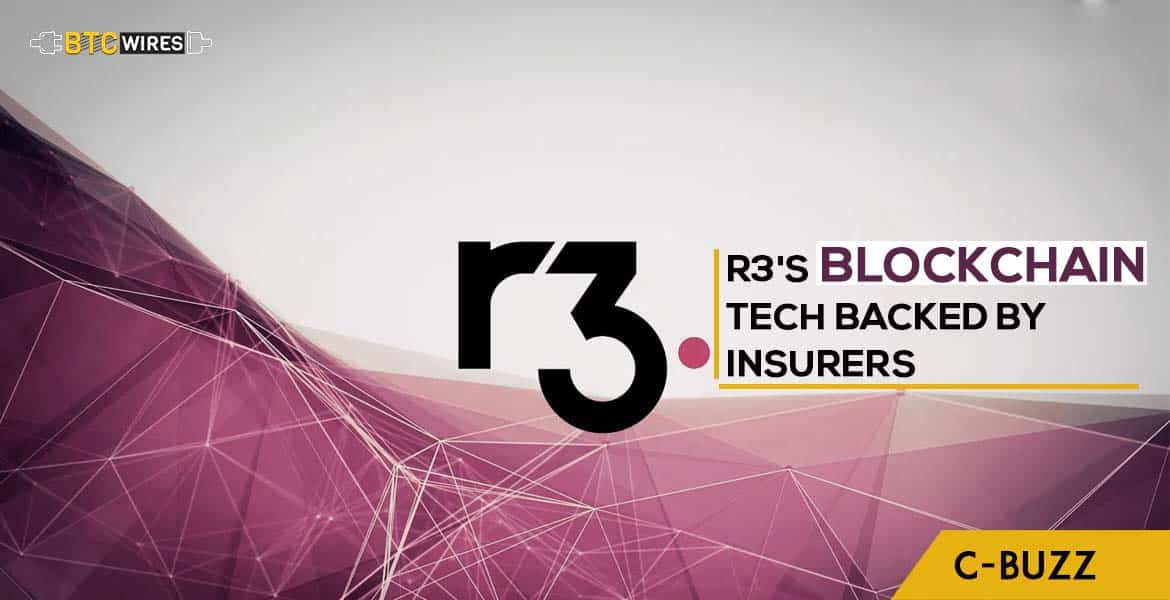R3’s new blockchain tech is making headlines everywhere. Recently, its

R3’s new blockchain tech is making headlines everywhere. Recently, its been in the news due to its hefty victory in the insurance sector, where it trumped other distributed ledger technology (DLT) providers to emerge as the top choice for insurers.
Anyone who is anyone in the blockchain sector knows of the RiskBlock Alliance. So what is it? According to their official website “The Institutes RiskBlockTM Alliance is an unprecedented, industry-led consortium collaborating to unlock the potential of blockchain across the insurance industry. RiskBlock will accelerate time to market and adoption through real-world applications and impactful blockchain use cases.”
Now this alliance includes insurance heavyweights such as Chubb, Marsh and Liberty Mutual, who have all decided to build its first set of use cases, which is a list of actions typically defining the interactions between a role and a system to achieve a goal, using R3’s Corda platform.
The European reinsurance consortium, B3i, sort of pioneered this change. They were the first one who switched from Hyperledger Fabric to Corda. Now that R3 have RiskBlock covered, they can proudly claim that all the major insurance blockchain consortia are Corda users, including the Insurwave marine insurance platform, brainchild of EY and Maersk, along with regional initiatives in India and Italy.
RiskBlock officially came into being in mid-2017 and the team behind the DLT consortium has tested enterprise blockchain solutions for almost two years now. Earlier this year, RiskBlock were looking into the following options: Hyperledger Fabric, Quorum (developed by JPMorgan Chase), Corda, and Digital Asset.
“We went through an intense and laborious process and finally narrowed it down to two, which were Corda and Digital Asset,” said the vice president at RiskBlock, Patrick Schmid.
“It was a close race – and we haven’t worked out all the details yet – but we have decided on Corda and we are moving in that direction.”
RiskBlock, being a founding member of the Ethereum Enterprise Alliance, has worked extensively on a private version of ethereum, the world’s second-largest blockchain. However, on receiving several inputs from member firms and also some of its potential partners, they decide to change their system this year.
The main concern of these companies was privacy, or the lack of it, in a system forked from a public network. Schmid said “What we learned from testing ethereum was that our members found huge value in the smart contracts, and found huge value in blockchain-enabled technology. But they were a little bit concerned about data segregation…Even with a private variant of ethereum, their concern really was around data being stored, even if it’s encrypted and hashed, on every node in the system.”
There have been a lot of new modified additions to the new RiskBlock applications. They include proofs of insurance (with the goal of identifying uninsured motorists); better methods of data sharing when a policyholder is initially notified by the insurer that he/she will be filing a claim; subrogation (imagine your auto insurance carrier pays you after an accident and then pursues the other driver’s carrier for reimbursement). There will also be a greater focus on blockchain-based net settlement; and parametric insurance, which is automatically paid out in times of natural disasters or catastrophes.
When asked about the timeline, Schmid said, “Everything is in progress now. We anticipate that we’ll have POI and First Notice of Loss fully complete and ready for member testing before the end of summer.”
Rumor says that R3 is struggling financially, which is why this win for their technology comes at a great time. The company is ready to release the commercial version of its enterprise software next week.
Ryan Rugg, global head of insurance at R3 said “Over the last few months we have seen several insurers migrate to Corda due to its enhanced privacy and scalability; information is shared on a bi-lateral or multi-lateral basis, meaning parties that are not involved in the transaction will not see it.”
“Corda gives insurers the ability to integrate and secure disparate data sources, whilst simultaneously ensuring transparency across an interconnected network of clients, brokers, insurers and other third parties,” he added.
As soon as B3i switched from Hyperledger to Corda, it prompted fellow insurance consortium RiskBlock to go with the same.
Schmid said that “One of the major catalysts for us to narrow our selection process down to ranking Corda at the top was that it’s potentially also going to be leveraged by European reinsurers in the B3i initiative and by the InsurWave initiative – and some other smaller initiatives,” he said.
To get into a little more detail about B3i, it was founded by insurance top players Allianz, Aegon and Swiss Re, and supported by AIG and AIA. When asked, they gave similar answers for their decision to switch
“After re-evaluating our criteria around data privacy, developer productivity and interoperability we concluded that Corda is a perfect fit for our insurance use cases and also for our future strategy for an insurance business network,” said Markus Tradt, CTO at B3i.
He emphasized on the importance of interoperability, and said “interoperability is crucial for us. To that end, we are actively pursuing collaboration or partnerships with other platforms and initiatives.”
